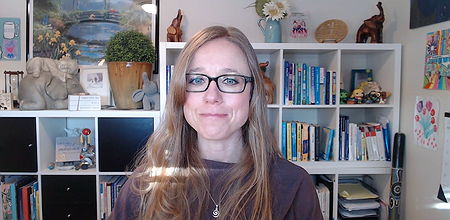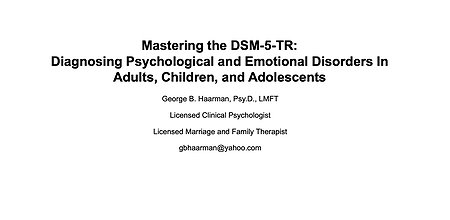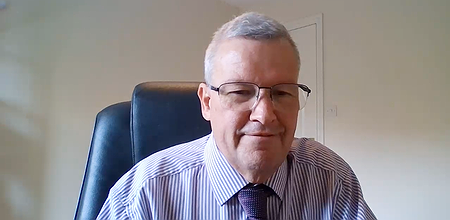A theoretical course illustrated with clinical examples. This course is composed of videos of 5 to 15 minutes each. The PowerPoint of the course to download.
Best Practice Standards and Treatment Principles in Neurotherapy
Dr. Mari Swingle, Psychotherapist
Exploring science, skill & practice needs: Neurotherapy is a burgeoning field of practice
 Introduction to key constructs and practices
Introduction to key constructs and practices
 Emerging Practice
Emerging Practice
This course is based on preliminary data and explores a promising area of research, which is expected to evolve rapidly.
Excerpt: what is neurotherapy ?
- 2h30 of continuing education
- 23 lessons that last from 5 to 15 minutes each
- 1 certificate of achievement
- 1 PowerPoint
- 1 bibliography
- 1 course evaluation
- 4 months access - automatically extended until you complete the course
- 7-day money back guarantee
- 97% of participants who completed the satisfaction survey declare they would recommend this course to a colleague
Overview
As the popularity of Neurotherapy increases so too does the confusion surrounding it. This presentation will cut through the flash and jargon to the foundations of Neurotherapy. Dr. Mari Swingle will first present the science behind the empirically supported practice of electroencephalographic (EEG) brain training followed by information that will help practitioners, and the public they serve, to understand and differentiate between legitimate practices, experimental practices and uninformed, unsupported, and potentially harmful practice. Participants will gain a basic comprehensive understanding of what Neurotherapy is and how it works (e.g., methods and mechanisms of action), how the tools work (e.g., electrode placement, data bases, and data selection), the qualifications needed to practice (e.g., psychologists and/or LD specialists), and at what level of intervention (e.g., what skills/knowledge are needed to read and operationalize the EEG). After presenting the basics, Dr. Swingle will outline a three-tiered classification system which is now the basis of the APA proficiency standards (2019-2026). In proper hands Neurotherapy is arguably one of the most powerful intervention modalities. In unqualified hands it can be ineffective, imprecise, and potentially harmful. If you are interested in adding Neurotherapy to your practice or wish to be better informed to counsel or refer clients to bona fide practitioners, this workshop is an ideal introduction.
About the expert

Dr. Mari Swingle, psychotherapist, clinical researcher, author, educator, and public speaker.
She has a MA in Education and an MA and PhD in Clinical Psychology, and has been working in the field of Applied Psychoneurophysiology / Neurotherapy for over 25 years. She is a BCIA Certified Mentor who was BCN /EEG certified in Neurofeedback in 2000, was awarded Associate Fellow status in 2005, Fellow in 2010, and Senior Fellow in 2017.
She sat on the Board of Directors of Association for Applied Psychophysiology and Biofeedback (2017-19), wherein her primary mandate was constructing a classification system for Neurofeedback Proficiency Standards for the American Psychological Association (APA). She was awarded AAPB Fellowship in 2020. Dr. Mari Swingle is a champion of Neurotherapy, continuously contributing to the advancement of research and practice on which she presents regularly at professional conferences. She is dedicated not only to the advancement of clinical treatment but to disseminating professional and lay understanding of what Neurotherapy/EEG BrainBiofeedback is, and equally, what it is not.
Learning objectives
- Gaining insight into the current state of practice on Neurotherapy.
- Understanding practice qualifications (3 levels).
- Understanding equipment choice and equipment standards.
- Learning about methods: assessment, data collection, data operationalization and brain entrainment.
Learning material
Syllabus
- PowerPoint
-
Introduction to Neurotherapy
- 1. Presentation
- 2. Neurotherapy
- 3. Location
- 4. Amplitude and Ratio
- 5. Recording
- 6. The full cap
-
Practical Applications
- 7. Demonstration I - Reading
- 8. Enter Data Bases
- 9. Conversion
- 10. Training Functional Biology
- 11. Demonstration II - Video game
- 12. Demonstration III - Calming protocols
-
Professional Considerations and Standards
- 13. My Professional Preference
- 14. Proficiency
- 15. Practitioners and Equipment
- 16. Lack of Demarcation
- 17. My Professional Resistance
- 18. Measurement Is Key
- 19. Standards of Practice
- 20. Alpha
- 21. Pharmaceutical Industry
- 22. Price of Popularity
- 23. Conclusion
- Bibliography
CE Credits
Download a certificate of successful completion.
Audience
This training is intended for mental health professionals.
Registration
Ask a question
Do you have a question? Then email us at contact@asadis.net
Frequently asked questions
-
How long do I have access to the course?
After your registration, the course is accessible anytime and from anywhere for 124 days. And if that’s not enough, we’ll automatically extend your access.
-
When does the course start?
That is entirely up to you! When you buy a course, you'll receive an access link that you can activate when you want.
-
Is there a student rate?
Yes there is! To learn more, email us at contact@asadis.net.
You may also be interested in:
Legal notice
The courses offered by ASADIS are accredited by different professional organisations. In addition, ASADIS is approved by the Canadian Psychological Association to offer continuing education for psychologists. ASADIS maintains responsibility for the program.
The CPA’s approval of an individual, group, or organization as a CE Sponsor or Provider is restricted to the activities described in the approved application or annual report form. The CPA’s approval does not extend to any other CE activity the Sponsor or Provider might offer. In granting its approval, the CPA assumes no legal or financial obligations to Sponsors, Providers, or to those individuals who might participate in a Sponsor or Provider’s CE activities or programs. Further, responsibility for the content, provision, and delivery of any CE activity approved by the CPA remains that of the CE Sponsor or Provider. The CPA disclaims all legal liability associated with the content, provision, and delivery of the approved CE activity.




